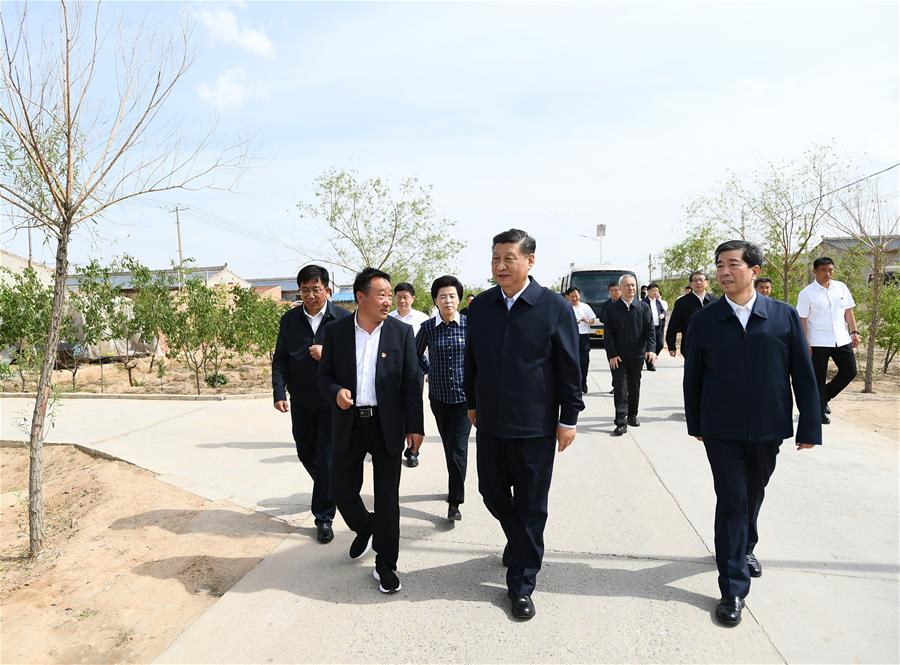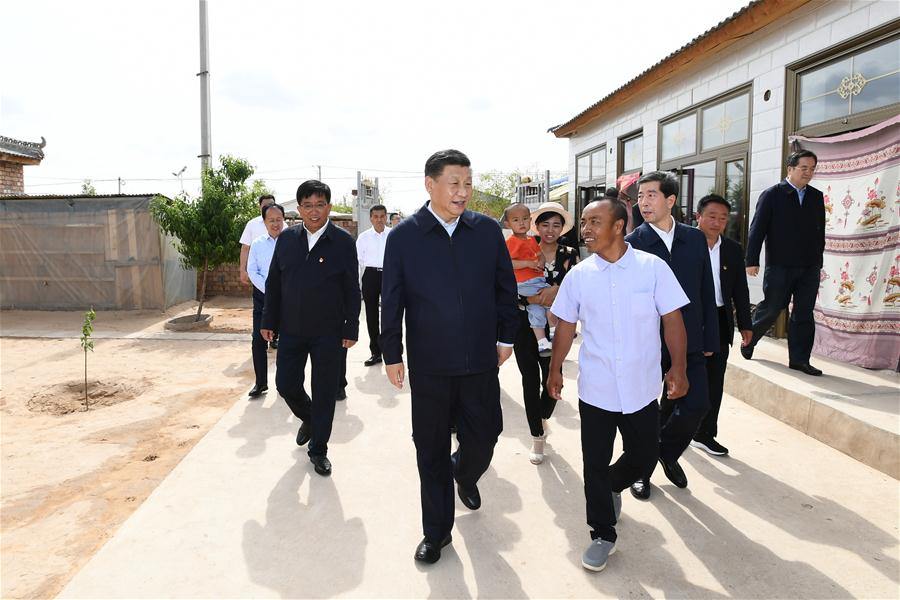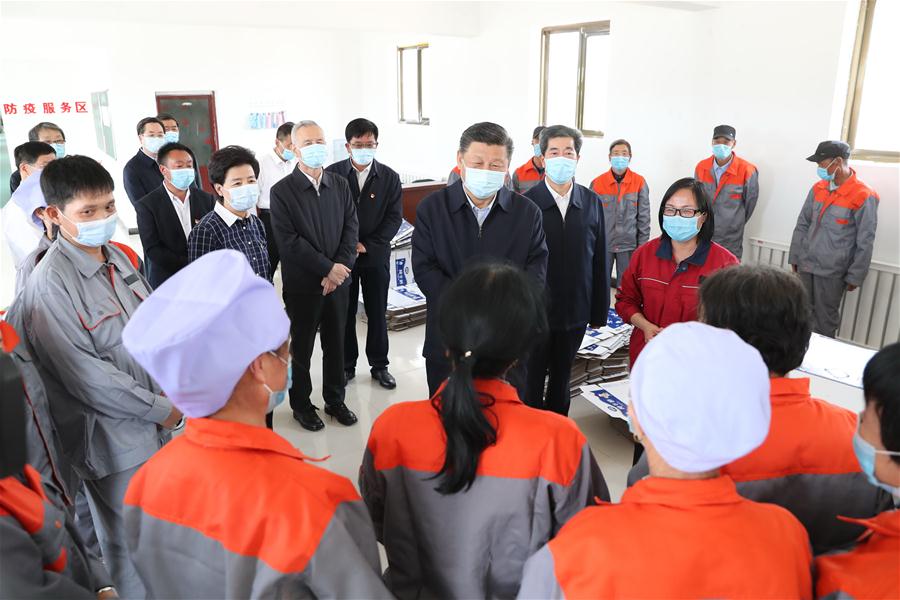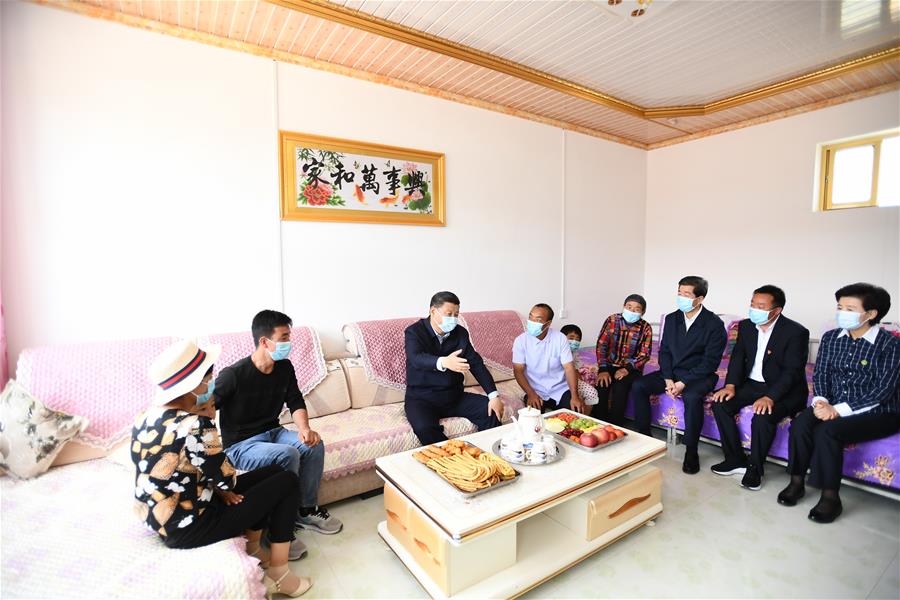On June 8, 2020, President Xi Jinping visited Hongde village, an ecological immigrant village in Hongsibu town, Northwest China’s Ningxia Hui Autonomous Region, to learn about efforts to advance poverty alleviation.
In the village, Xi Jinping inspected a poverty alleviation cooperative, and stressed that building a few pretty houses is far from finishing the job. Villagers must have the potential to be well-off to fully settle down, he said.

Chinese President Xi Jinping learns about efforts to advance poverty alleviation in Hongde Village of Wuzhong City, northwest China's Ningxia Hui Autonomous Region, June 8, 2020. (Photos: Xinhua)
This cooperative was jointly built by Fujian and Ningxia. The workers at the cooperative are all from the nearby area. Most are old and weak. They used to be poor, but now they work from home, making handles for cardboard boxes. This earns them about 1,000 yuan ($154.8) a month.
Xi told the person in charge that the purpose of setting up centers is to help the poor. It is necessary to stick to the goal of poverty alleviation, and recruit more people who have difficulty finding employment. It is important that companies participate, he added.
Xi then inspected the village on foot. At villager Liu Kerui’s house, Xi carefully learned about the family’s employment, income, medical care, and social security situations. Liu told Xi that the family has transferred its farmland to a company and now raises three cattle. His son and daughter-in-law work in a nearby textile factory.
In 2017, the family escaped poverty and life has been getting better thanks to support from the government.
Xi asked Liu about difficulties the old couple still faced and plans they had for the days ahead, emphasized that a better life will surely come. Xi hopes that people will make further progress, and fully make use of their enthusiasm, proactiveness and creativity to create a better new life with their own hands.
When Xi visited Ningxia on June 8, 2020, his first stop was Hongde village. Since the end of the 1990s, nearly one million people in Ningxia have moved from Xihaigu, which is known as the "suffering place,” to the Yellow River irrigation area at the foot of Helan Mountain. Hongsibu district alone had successively received 233,000 immigrants, making it the country's largest ecological poverty alleviation immigrant concentration area. Hongde is a new village there.
"The president asked us meticulously and kindly with care," Liu said. "We truly realized the greatness of our country and the Party."
During the 13th Five-Year Plan (2016-2020), more than 9.6 million registered poor people across the country moved from adobe houses, thatched cottages, and dilapidated houses into spacious, bright, safe and stable new homes. The relocated people completely escaped poverty that was caused by geographical factors.
Relocating people to better places

“I used to live in a house with mud walls and had nothing to drink but alkaline water,” said Liu, while walking around his new dwelling, furnished with a courtyard, new furniture and home appliances.
When Liu and his family first settled in Hongde village in 2012, they were allotted a two-bedroom 54-square meter brick house. In 2017 when the Liu family officially rose from poverty, he added 2 more rooms. Liu has just had a new boiler installed, which provides the house with proper heating.
The Liu family annual income has increased tenfold in the past 8 years, now reaching a solid 100,000 yuan ($15,478.4) per year, including all incomes and profit from their share in the village cooperative.
“It was Xi who helped us 'pull out the roots of poverty'. Now my life has definitely changed for the better,” Liu said. He pointed to an old photo of their mud house and remembered how Xi looked at the photo and was surprised by the huge change in their lifestyle.
Liu is not just one of the lucky few. In fact, all 1,146 households (5,058 people) that were registered as poverty-stricken in Hongde in 2014 have now risen from poverty. The average disposable income of farmers have grown from 1,800 yuan ($278.6) to 8,435 yuan ($1,305.6) over 5 years.
The trickiest problem in the immigrants’ old life was a lack of drinking water. Now, not only do immigrants to Hongsibu town have access to clean drinking water, what used to be a desert has also witnessed its greenery coverage ratio grew to 26 percent, thanks to an irrigation program.
Neat new homes, hardened village roads, jolly faces of children, and new facilities like an elementary school, kindergarten, and health-care centre constitute a delightful rural scene.
A villager said with pride that the village is now connected to the internet. “We have what the city folks have now.”
As a special poverty alleviation project for people living on poor land that can’t support their livelihood, relocation is a crucial weapon for winning the battle against poverty. It aims to help people "pull out the roots of poverty" and supports relocated people’s livelihoods, helping them "leave poor nests" and "ditch poor jobs.”
Today, the task of resettling poverty-stricken people from inhospitable areas during the 13th Five-Year Plan period has been fully completed. During the 14th Five-Year Plan period, China will work on the follow-up system for the relocation project and renew efforts on supporting the settlers’ employment to cement their shelter and income.
Better job leads to better lives
Xi said during the visit that the relocated people cannot fully settle down without a stable roof and the potential to be well-off. This is why factories and poverty alleviation cooperatives aim to provide stable employment.

Better jobs leads to a better life. For this reason, the Hongsibu district has taken various measures to support the settlers’ livelihood.
By the end of 2020, 12 labor-intensive enterprises and 13 poverty alleviation cooperatives were set up in the district, providing 11,000 rural women with business and job opportunities and helping over 3,200 disabled people steadily increase their incomes.
Hongsibu is not a singular case. Actually, registered settlers across the country are better employed than before relocation. All relocated families have at least one member with a job and their income level has also been significantly improved.
Statistics suggests the average net income per capita of registered households relocated from inhospitable areas nationwide has increased from 4,221 yuan ($653.3) in 2016 to 9,313 yuan ($1,441.5) in 2019, with an average annual increase of 30.2 percent. "After the villagers moved, a better life will surely come “
Better life will surely comes
"What Xi said, about a better life after we moved, has motivated us," Liu said with a shy smile.

What is essential after relocation work is to solve the livelihood issues of people in poverty, said the party leader of the district Zheng Huiling.
“A total of 21 construction projects have been planned, worth approximately 103 million yuan ($15.9 million). Nine projects have been completed with a total investment of 33.59 million yuan ($5.2 million),” Zheng said. Hongsibu district develops and expands industries based on local conditions to ensure a stable and sustainable income for immigrants.
As of the end of September 2020, Hongsibu district had 7,200 hectares of grapes, 3,733 hectares of wolfberries, and 5,347 hectares of day lilies. The number of beef cattle reached 107,000 and tan sheep reached 860,000. More than 4,667 hectares of land has been transferred to high-ranking enterprises. At present, more than 90 percent of the registered households in Hongsibu district have participated in industries that could bring them more income and wealth.
The village has also founded cattle breeding companies, selling products throughout the country.
"Happiness is the result of hard work," Ren Jun of Hongde village said while talking about the expanding beef cattle industry. "We will keep in mind President Xi's guidance and strive to build Hongde village into a demonstration village for relocation, an advanced village for rural revitalization, and a model village for urban-rural integration."
(Translated by Huo Jiamian and Wang Chunxiao, edited by Bao Han)


